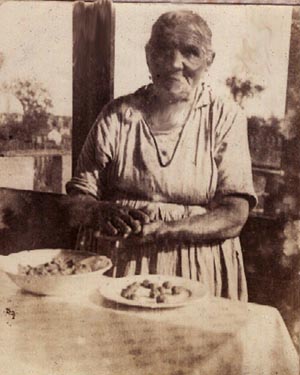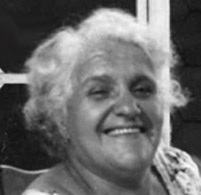
Borgetto is circled. The purple dot is Monreale, and the green dot is San Cipirello ... both important in our history. San Cipirello is the native town of the Quartuccio family from which our grandmother, Antonietta, came.
 |
There were 7 children born to Giuseppe Quartuccio (1837-1896) and Giovannina Ferrara (1843-1937). The names of the children in order of their birth are: Antonino, Maria, Salvatore, Giuseppe, Antonietta, Gioacchino, and Paolina.
Antonino Quartuccio married Ursola Tobia, daughter of Leonardo, and Antonietta Quartuccio married Guiseppe Tobia, son of Antonino. These children and all their descendants are also our cousins. It must be understood that in Sicily at the time, when a person married another, they were also marrying the families. I remember as a kid that the grandparents spoke of the brothers and sisters and whoever like they belonged to that family, so it took me a while to know who was who, and to whom they belonged.
 |
I remember Grandma Tobia telling me that when some young man made it known that he was interested in a young girl, he mentioned it to his father. His father then went to the father of the girl and told him of his son's intentions. If it was agreeable to both parties, a "date" was arranged. This date consisted of the young man and woman sitting on opposite sides of the large room and with them their families. The young man and woman only looked at each other while the families spoke. The next date consisted of the couple walking ahead of the two families. No touching was allowed ... only talking, and only several paces ahead of the two families. The next date consisted of them having privacy on their walk. And the entire town knew that these two were destined to marry at the appropriate time.
There was an unwritten law among Sicilians that an unattended woman, married or single, was never allowed to be alone with a man, other than her husband or her family. If by chance, a man would enter upon an unwed woman and close the door, that woman was thereafter not suitable for marriage. The reason being that something of a sexual nature could have happened behind closed doors, and since all other women were home during the day and night, they would know if a door were closed and if the woman behind that door was in respectable company or not.
Now it happened that Uncle Tony Quartuccio was enamored of Ursola Tobia, but she was promised to someone else. So, using the system against itself, he went in to her house when she was alone and closed the door. That settled that. She could no longer marry her intended, but Tony was more than willing to make her an "honest" woman again. Very romantic.
UPDATE: From Cousin Ted Quartuch in Milwaukee, July 07. "Uncle Tony (Antonino Quartuccio) and Aunt Ursola got married on Easter Sunday in front of the church with many other couples who had waited during Lent, when it was not usual for the Church to perform matrimonies."
Regarding her own marriage, Grandma Antonietta mentioned that she had nothing to say about it. Fortunately, she learned to love our grandfather. The banns were announced in church for 3 Sundays, during Mass, and the wedding took place. Our grandparents lived in the home of the Tobias in Borgetto for a while.
UPDATE: July '07...While visiting in Milwaukee with Cousin Ted, he informed me that our great-grandfather Giuseppe Quartuccio died of cancer as a result of a wound caused by a poisonous spear-head which he received during the Abyssinian War of 1896. Here is an exerpt from the Catholic Encyclopedia... This prompt and lucky campaign of the English was to inspire the Italians twenty-eight years later to make a like bold attempt. Their ambition designs, however, roused the whole country against them, and the bloody battle of Adua (March, 1896), in which almost 20,000 were killed, put an end to their rash undertaking. In 1897, Mr. Rodd, first secretary of the British Ligation at Cairo, was entrusted with a mission to the Negus. A treaty was signed 14 May, and Menelik proclaimed the Mahdists enemies of his empire. He also asked for the adjustment of the frontiers between Harrar and Somaliland. Lastly, a Franco-Anglo-Italian agreement was concluded which guaranteed the independence of Ethiopia and assured to the three Powers bordering on the kingdom their respective rights and interests.